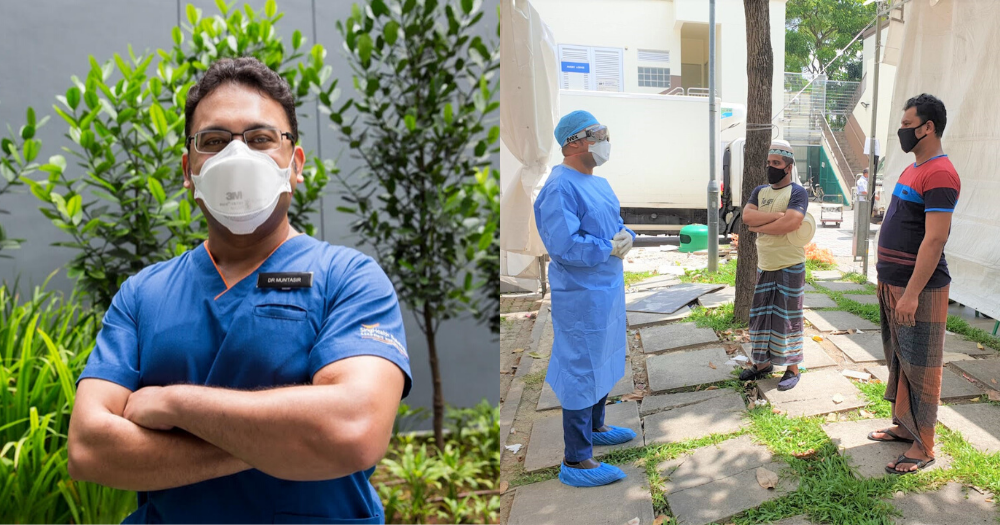“Fatherhood as a doctor is not an easy journey,” doctor Muntasir Mannan Choudhury, a consultant with the department of Hand Surgery at Sengkang General Hospital, shares with me.
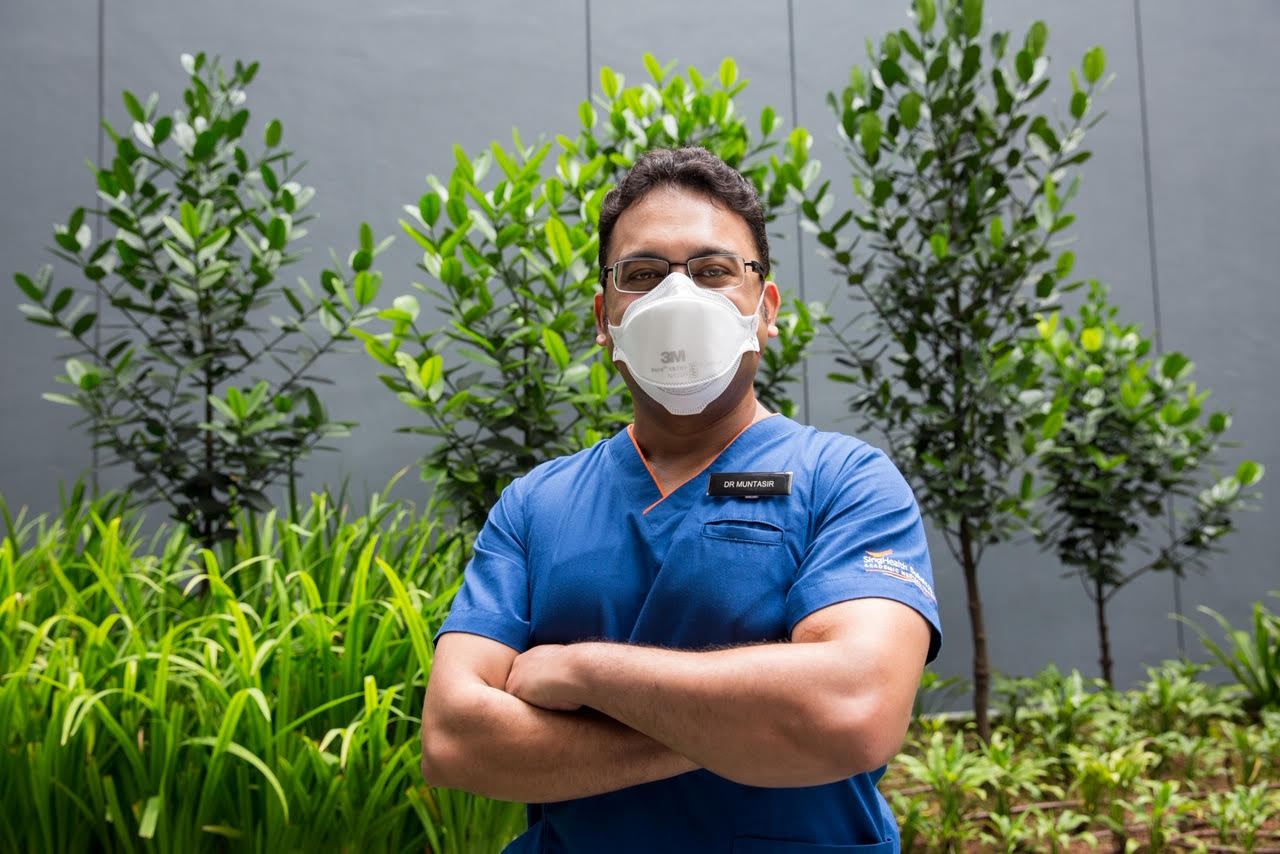 Photo courtesy of SKH.
Photo courtesy of SKH.
The father of a 10-year-old son and a five-year-old daughter — whom he calls his "prince" and "princess" — knows all too well the difficulties that come along with juggling his medical duties and his time with family:
“The years when my children came into my life, I was still in training as a specialist.
There were many days when I used to come back home late from work and they were already in bed. When I used to get out of the house in the early hours in the morning, they would not have woken up as yet.
It was sometimes many days in a stretch without any interaction with them.”
And during this Covid-19 pandemic, his work has gotten all the more difficult and time-consuming, as he has been part of the on-the-ground response to the dormitory clusters, helping primarily with communications work.
Throughout our chat, one recurring theme stands out: The importance of support from those around you and being part of a team, whether that be within the family, in the workplace, or throughout Singapore.
Wanted to be part of the response
When the Covid-19 pandemic first broke out in Singapore, Muntasir was actually in Perth, where he was participating in a 6-month fellowship, mentored by one of the top hand surgeons in Australia.
As the pandemic worsened globally, SKH’s senior management reached out to Muntasir and his colleagues to check in on them, and ultimately decided to call them back to Singapore in late-March.
While serving his mandatory 14-day Stay-Home Notice (SHN) upon returning home, Muntasir followed the news about the first clusters developing in Singapore’s migrant worker dormitories.
He knew immediately that he wanted to get involved, and anxiously awaited the end of his SHN so that he could get back to work.
Coincidentally, he received a call from the hospital as he was finishing up the last few days of his SHN, asking:
“You speak Bengali, right? When are you coming back? I think we’re gonna need your help.”
On-the-ground in the dormitories
And so in April, Muntasir and a team — which consisted of people in a variety of roles, such as administrative staff, clinicians, nurses, and allied health services — started their work at the dormitories, swabbing workers and taking care of their medical needs.
The work, understandably, was difficult:
“The early days were very daunting because it was unfamiliar ground.
It was hot — by one hour’s time, we were already soaked down to our skin, sweat dripping down to our shoes and everything.”
Even so, the physical difficulty gave the team a glimpse of what migrant workers — especially those working in construction — go through. It was, in Muntasir's words, a "humbling moment".
One thing that helped with team morale was the encouragement and presence of team leaders and people in senior positions being right there on the ground with the rest of them, rather than just directing from above.
Using a military analogy, Muntasir explains:
“If you think about a soldier in the trenches … If you looked across the trench, you could see — wearing the same gown — were our very senior people of the hospital.
They were there … Leadership by example.”
Spreading awareness and reassurance
In addition to providing medical care, the teams also did their best to spread awareness about the virus to the workers and reassure them, as they were visibly frightened.
However, communicating with the workers also came with its own set of challenges.
For one, the staff “didn’t exactly look like normal human beings” because they are always dressed in personal protective equipment (PPE), Muntasir admits:
“The scrubs, the masks, the goggles, the face shields…I mean, when I look at one of my photos, I can even barely recognise myself!”
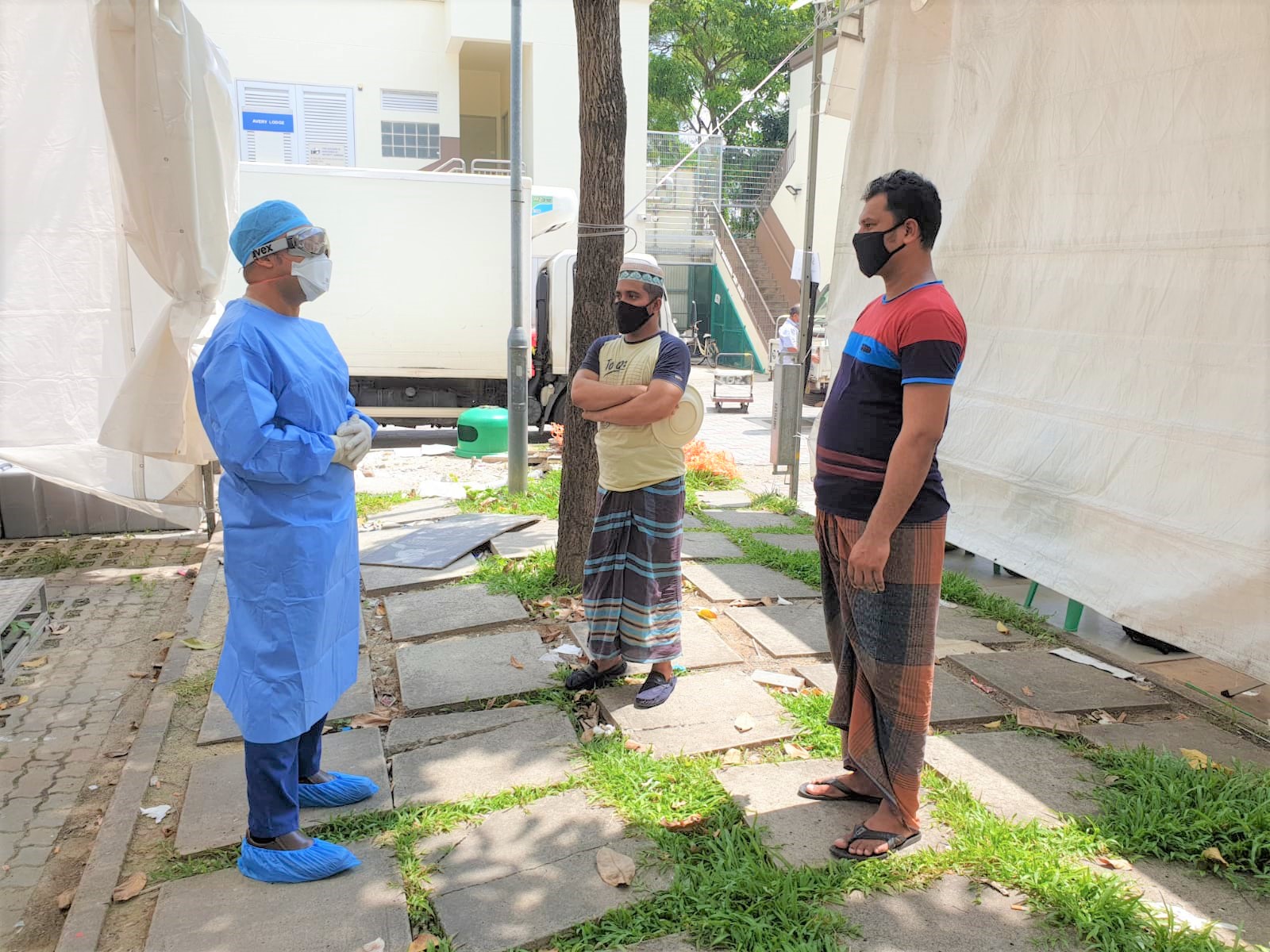 Muntasir (left) communicating with workers while in full PPE. Photo courtesy of SKH.
Muntasir (left) communicating with workers while in full PPE. Photo courtesy of SKH.
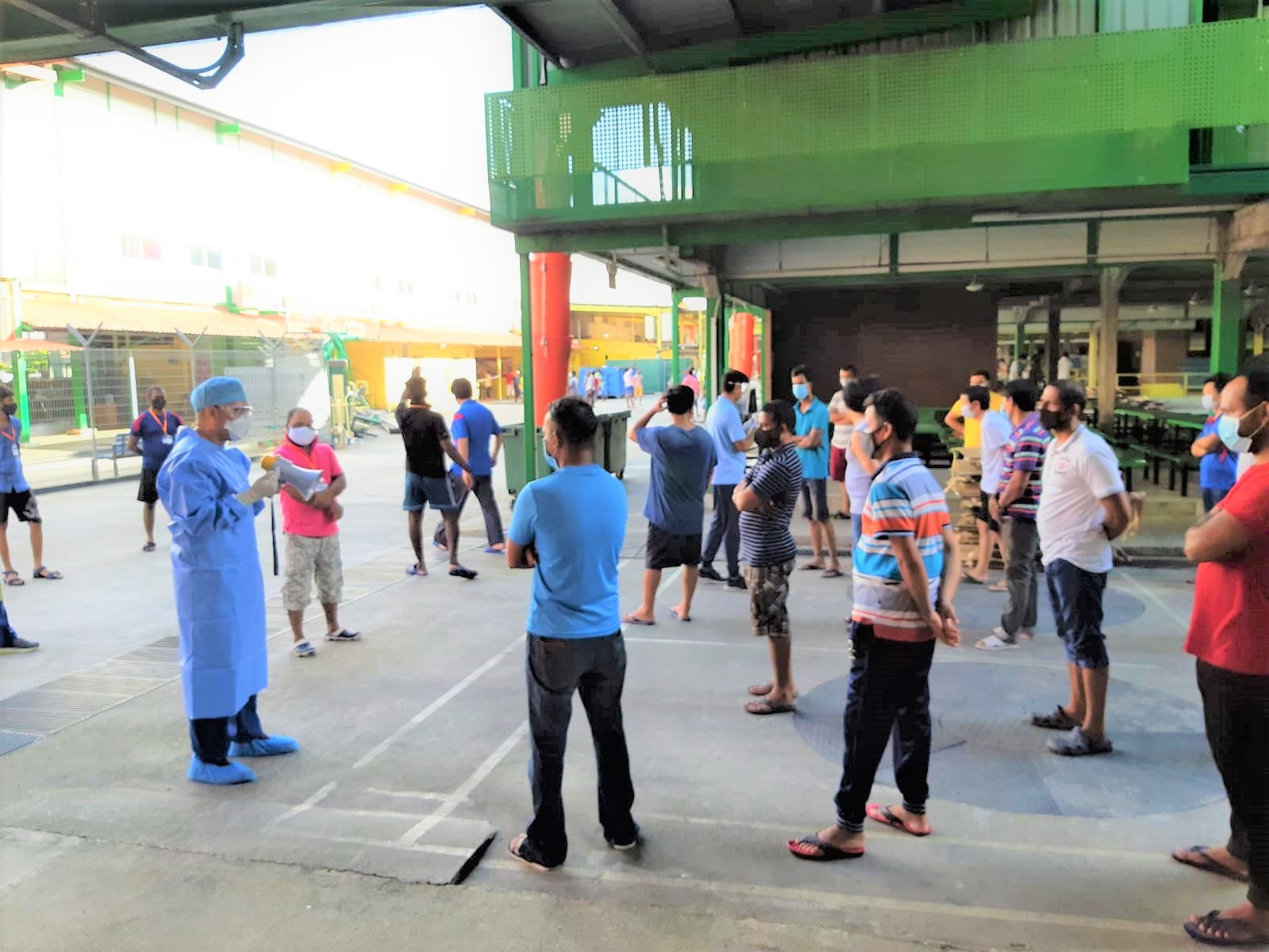 Muntasir (left, holding loudhailer) communicating with workers while in full PPE. Photo courtesy of SKH.
Muntasir (left, holding loudhailer) communicating with workers while in full PPE. Photo courtesy of SKH.
Thankfully, Muntasir was able to connect with the workers through Bengali. Being spoken to in their native language brought out an immediate reaction, he says:
“Whenever I started speaking, I could see their eyes lighting up in recognition of the familiar lingo they were using.”
When he asked how they were doing, they responded in Bengali:
“We’re not fine. We’re afraid. We don’t know what’s going to happen to us.”
Muntasir and the fellow staff would reassure the workers, but they found that the one-to-one and small group communication was too slow, given the large number of people in the dormitories.
“You are one of us, we will take care of you”
So after some brainstorming, Muntasir’s team made a decision that, in his words, took communication to an "absolute different level.”
They decided to use loudhailers to communicate with the workers en masse, with Muntasir and a Tamil-speaking colleague, doctor Hamid Rahmatullah, walking up and down each of the blocks:
“The message was simple — we’re here for you. There’s nothing to be afraid of.
We know that you have been afflicted. We're here for you. We're gonna walk the path with you. There’s nothing to be afraid of.
We know what you have done for Singapore. You’ve build the houses, you’ve built the roads. And we believe that you have done your part, so let us do our part at the same time.”
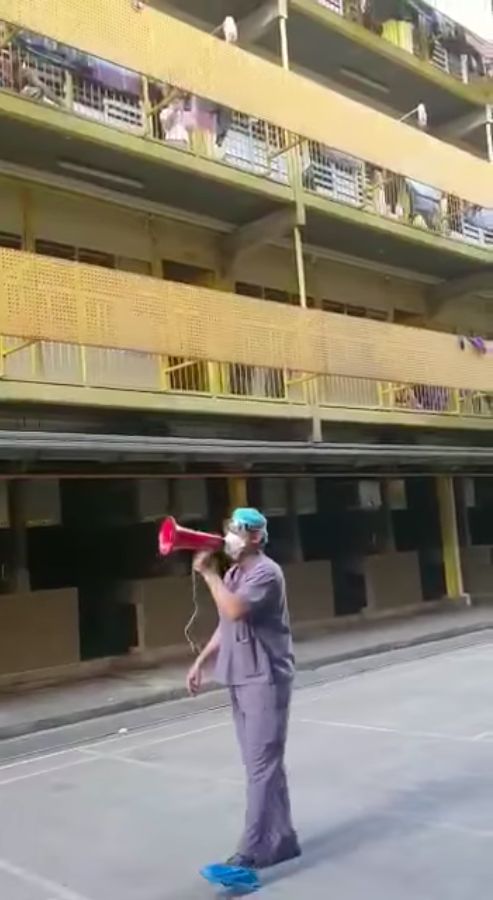 Photo screenshot via Facebook / Sengkang General Hospital.
Photo screenshot via Facebook / Sengkang General Hospital.
And while the two doctors repeated the same message each time they reached a new block, it did not get repetitive. In fact, Muntasir shares, the fervour and passion in their voices increased with each iteration.
“And halfway through, we were actually received with a tremendous amount of applauses and everything.
It was truly a magical moment. We have broken the barrier and we have managed to reach out to them.”
He adds, “It was surreal, literally. It was surreal.”
A video of Muntasir sharing the message in Bengali was posted to Facebook by SKH and has been shared more than 8000 times.
Workers do take responsibility for their hygiene
Through their broadcasted messages, the doctors also reminded the workers to practise social distancing and observe good hygiene practises.
Throughout the pandemic, the issue of hygiene has been a contentious one in public rhetoric. There have been some sentiments that the outbreak of Covid-19 in dormitories was due to migrant workers’ poor hygiene practises and cultural backgrounds.
From Muntasir’s point-of-view, though, he shares that he has seen the migrant workers taking responsibility for their own hygiene.
“Well, I'm not entirely sure how it was before [the outbreak],” he admits. “But now when you go down to the dorms, you can see that they’re actually asking for soap, they’re asking for water.”
He says that the workers have been actively doing their part to keep their surroundings clean:
“They combined their forces themselves, and they cleaned up the places themselves.
There was one guy who was telling me, ‘I disinfect the railing in front of my room every day.’
So that’s the vigour and the enthusiasm and the understanding we see on the ground. We don't have to tell them same thing again and again. They are telling this to us.”
Working closely with migrant workers
Although Muntasir is back to mostly working in the hospital now, he continues to be part of a team that helps handle communication and translation work for the dormitory operations.
He goes back to the dormitories whenever necessary, to meet with groups of migrant workers, sometimes for counselling purposes and other times to transmit information about what is being done for them.
Muntasir shares — a bit bashfully — that he has gained a bit of a reputation amongst the workers, with some recognising him from the loudhailer speeches.
“Nowadays when I go down to the dorms, I find out people know about me also, surprisingly,” he says, laughing. “So that's a fun part.”
He adds:
“I would prefer to go down incognito, but well, we do have to introduce ourselves. It’s the general norm, when you speak to the person or patient. So, ahh, really can’t bypass that, can we?”
He is hesitant to accept the recognition, partly because it is not what he strives for in his work:
“This is something I’m doing to give back to the community. I don’t want recognition. No one does, frankly speaking.
That’s going to be the last thing on my mind because that’s not what we’re working for. We’re working for the people. We’re working for ourselves.
This is soul food, in one sense. Because if I’m doing the right thing, I feel better.”
The experience of fatherhood has also been a source of connection with the workers as well.
One worker who tested positive for Covid-19 told Muntasir that, although he was well, he was afraid he may never see his five-year-old daughter again.
"Fear does prey upon one’s mind and can lead to depression which is the new enemy, and as a father, I do understand where he is coming from.
When I was in Perth and borders were closing down, I had the same fear.”
Muntasir’s translation work has also spanned outside of his direct work in the dormitories. For example, Muntasir met Omar Faruque Shipon, who runs an popular Facebook page for fellow Bangladeshi migrant workers in Singapore, online.
The page has more than 53,000 followers, and Muntasir tells me that Omar spends more than four hours every day translating major news updates into Bengali so that other migrant workers can access them.
Muntasir helped to translate an essay by Omar about celebrating Hari Raya during the Covid-19 pandemic, which we published on May 24.
Family has been source of support and encouragement
Muntasir shares that his family has been a huge source of support to him during this time:
“My wife has been my muse, the firm pillar of my life; and as always, she has been very supportive of what I have been doing.”
And his children have also been very understanding about the work that he is doing:
“They know this is what I am supposed to do and I can see the glimmer in their eyes which reflects their pride.
… They know that I am trying to help people who are in difficult times in the dormitories and they relate to me that they dream of being able to help people in their own ways one day.”
His daughter recently also provided an unexpected pick-me-up when her preschool class made cards of appreciation for healthcare professionals.
Muntasir shares that when he came home after a hectic day, she was holding up a drawing of him in full PPE attire, holding a loudhailer, and surrounded by drawings of the virus, with the words “Be Safe, Baba.”
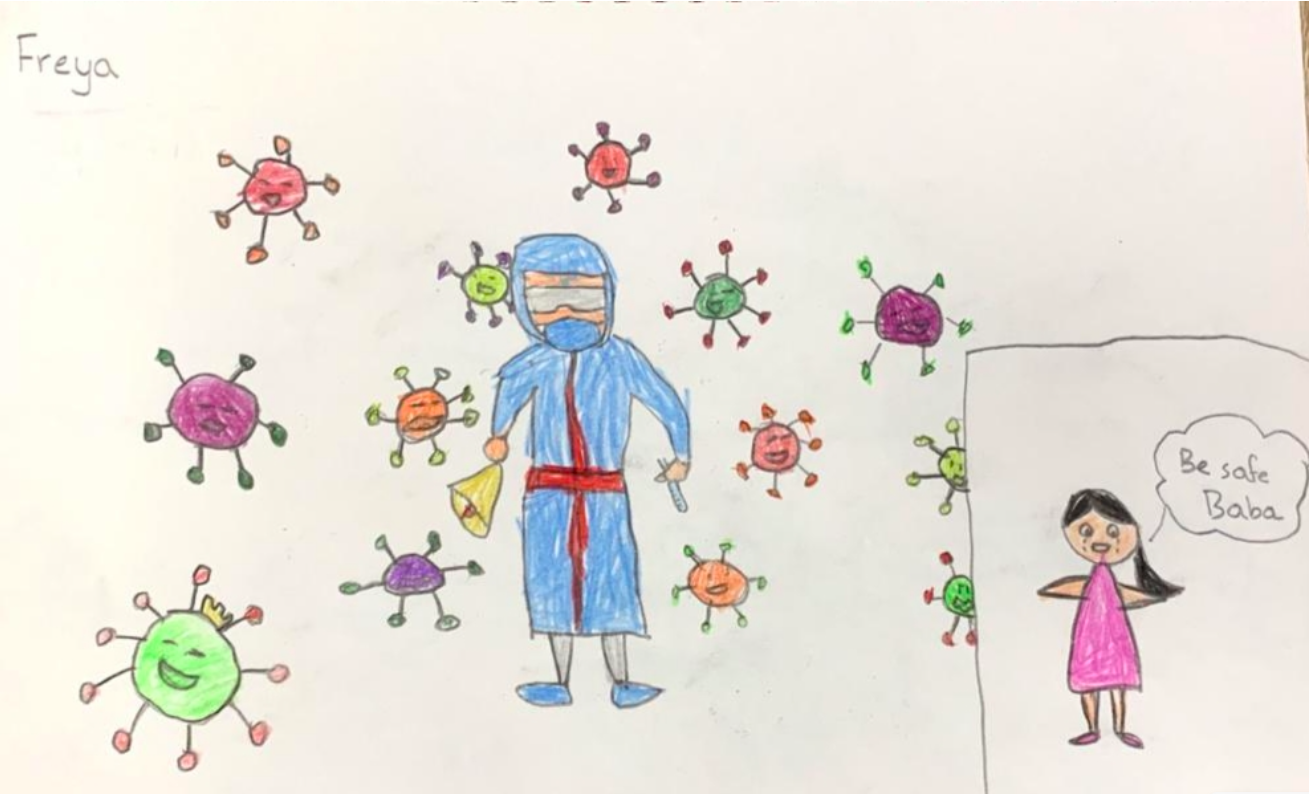 Image courtesy of Muntasir Mannan Choudhury.
Image courtesy of Muntasir Mannan Choudhury.
His wife, who also speaks Bengali, has also chipped in by volunteering to help with translation work for the hospital:
“She wanted to join the bandwagon as much as we did, so she does her part from home."
A hobby quilter, she has also sewn around 200 cloth masks for the community.
“I just saw a new shipment of fabric coming in, so I think she’s not stopping,” Muntasir laughs. “She’s going to continue on.”
While he was initially fearful of bringing the virus home from the dormitories, Muntasir has made sure to practise strict precautionary measures to protect his family, such as going straight to the shower when he arrives home and dumping his clothes into a bucket of soapy water.
And although his work during the pandemic has inevitably taken time away from being with his family, it has also made him appreciate the time they have together even more:
“It has made us value the time we spend together and we spend it to the fullest.”
Value of teamwork in the crisis response
Muntasir highlights the incredibly crucial part that teamwork — both amongst those directly on the frontlines as well as the general public in Singapore — has played in battling this pandemic:
“The way I see it, this was like a tsunami wave which was out there coming in our direction, nearly swamping us, when a group of good people early during this year when the first ones got started off gathered together, joined forces, produced a barrier against this Covid virus.
And when I look at this barrier again, it holds strong until today.”
And this barrier doesn’t just include healthcare workers or essential workers, he says:
“It’s every single person in Singapore who has done their part by staying at home, by wearing a mask, by maintaining social distancing;
The people who are doing the deliveries;
The people who are holding up the economy;
The leaders who are running the nation;
Even the children who has possibly not seen their playground for the last few months and possibly even forgotten about it;
The people who have been inspiring us,
The people who have been making masks out there for the community, all of them."
And despite the difficulties Covid-19 has caused, Muntasir points out the ways that it has made us stronger. While a calamity can bring out the worst in people, it has, in this case, brought out the best in many of us, he adds.
"We see life in a different manner. We value our families more. We love our loved ones even more than what it was before.
We understand our children better. We value our colleagues, our community people.
We value even strangers. I mean, friends have become brothers, strangers have become friends. And it’s a whole new world.”
So, what comes next in this pandemic response?
“We don't know exactly what's going to happen, to be very frank. But we know that we’re going to be together in this. And that's what we need to do consistently.
If we need to persevere, we’ll persevere together. If we need to keep on fighting it, we need to do the fighting together.
We need to do it as at team, as we have been doing in the early days and we’re doing it even now. And I hope that we will keep on doing it until we see an end to this.”
To migrant workers, he repeats the same message he broadcasted on the loudhailers to them — that every one in Singapore is in this together and we win or lose as a team.
As a father, he hopes that Singapore's response to the pandemic will inspire bravery and courage in his children:
“I hope they grow up being brave! Brave enough to do the right thing whatever the odds might be.
I hope they become responsible, caring, and passionate about relationships and the things they do.”
Stories of Us is a series about ordinary people in Singapore and the unique ways they’re living their lives. Be it breaking away from conventions, pursuing an atypical passion, or the struggles they are facing, these stories remind us both of our individual uniqueness and our collective humanity.
Top photos courtesy of SKH.
If you like what you read, follow us on Facebook, Instagram, Twitter and Telegram to get the latest updates.
